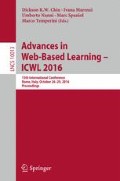Abstract
This paper proposes a new approach for predicting final student grade with high accuracy. It builds an attribute dictionary (AD) automatically from students’ comments collected after every lesson. Furthermore, it combines white-box models: Decision Tree (DT) and Random Forest (RF), and a black-box model: Support Vector Machine (SVM) to construct an interpretable prediction model and carry out eclectic rule-extraction. First, the AD is built from students’ comments, which are converted to attribute vectors. Second, the output decision is generated by SVM using the attribute vectors in the training phase and then DT and RF are applied to the output decision to extract symbolic rules. Experimental results illustrate the validity of the AD constructed automatically and the superiority of the proposed approach compared to single machine learning techniques: DT, RF and SVM.
Access this chapter
Tax calculation will be finalised at checkout
Purchases are for personal use only
References
nltk package. http://www.nltk.org/api/nltk.html#nltk.text.TextCollection
Barakat, N., Bradley, A.P.: Rule extraction from support vector machines: a review. Neurocomputing 74(1), 178–190 (2010)
Barakat, N., Diederich, J.: Learning-based rule-extraction from support vector machines. In: The 14th International Conference on Computer Theory and Applications (ICCTA) (2004)
Breiman, L.: Decision-tree forests. Mach. Learn. 45(1), 5–32 (2001)
Goda, K., Mine, T.: Analysis of students’ learning activities through quantifying time-series comments. In: König, A., Dengel, A., Hinkelmann, K., Kise, K., Howlett, R.J., Jain, L.C. (eds.) KES 2011, Part II. LNCS (LNAI), vol. 6882, pp. 154–164. Springer, Heidelberg (2011). doi:10.1007/978-3-642-23863-5_16
Khajah, M., Wing, R.M., Lindsey, R.V., Mozer., M.C.: Integrating latent-factor and knowledge-tracing models to predict individual differences in learning. In: Educational Data Mining (EDM), pp. 99–106 (2014)
Kijsirikul, B.: Artificial Intelligence. Department of Computer Engineer, Faculty of Engineering, Chulalongkorn University (2003)
Kudo, T.: Mecab program. http://sourceforge.net/projects/mecab/
Nidhra, S., Dondeti, J.: Black box and white box testing techniques - a literature review. Int. J. Embed. Syst. Appl. (IJESA) 2(2), 29–50 (2012)
Pardo, A., Mirriahi, N., Martinez-Maldonado, R., Jovanovic, J., Dawson, S., Gašević, D.: Generating actionable predictive models of academic performance. In: Proceedings of the Sixth International Conference on Learning Analytics & Knowledge, pp. 474–478. ACM (2016)
Salzberg, S.L.: Book review: C4.5: programs for machine learning. Mach. Learn. 16, 235–240 (1994)
Scheffel, M., Drachsler, H., Stoyanov, S., Specht, M.: Quality indicators for learning analytics. Educ. Technol. Soc. 17(4), 117–132 (2014)
Shibata, Y.: Negative structure in Japanese. Univ. Pennsylvania Work. Pap. Linguist. 20(1), 290–299 (2014)
Sorour, S.E., Goda, K., Mine, T.: Evaluation of effectiveness of time-series comments by using machine learning techniques. J. Inf. Process. (JIP) 23(6), 784–794 (2015)
Sorour, S.E., Mine, T., Goda, K., Hirokawa, S.: Predictive model to evaluate student performance. J. Inf. Process. 23(2), 192–201 (2015)
Tsytsarau, M., Palpanas, T.: Survey on mining subjective data on the web. Data Min. Knowl. Discov. 24(3), 478–514 (2012)
Wanli, X., Rui, G., Eva, P., Sean, G.: Participation-based student final performance prediction model through interpretable genetic programming: integrating learning analytics, educational data mining and theory. Comput. Hum. Behav. 47, 168–181 (2015)
Wise, A.F., Shaffer, D.W.: Why theory matters more than ever in the age of big data. J. Learn. Anal. 2(2), 5–13 (2015)
Acknowledgments
This work was supported in part by JSPS KAKENHI Grant Number 26350357, 26540183 and 16H02926.
Author information
Authors and Affiliations
Corresponding authors
Editor information
Editors and Affiliations
Rights and permissions
Copyright information
© 2016 Springer International Publishing AG
About this paper
Cite this paper
Sorour, S.E., Abd El Rahman, S., Kahouf, S.A., Mine, T. (2016). Understandable Prediction Models of Student Performance Using an Attribute Dictionary. In: Chiu, D., Marenzi, I., Nanni, U., Spaniol, M., Temperini, M. (eds) Advances in Web-Based Learning – ICWL 2016. ICWL 2016. Lecture Notes in Computer Science(), vol 10013. Springer, Cham. https://doi.org/10.1007/978-3-319-47440-3_18
Download citation
DOI: https://doi.org/10.1007/978-3-319-47440-3_18
Published:
Publisher Name: Springer, Cham
Print ISBN: 978-3-319-47439-7
Online ISBN: 978-3-319-47440-3
eBook Packages: Computer ScienceComputer Science (R0)

